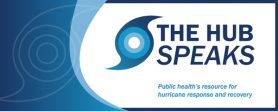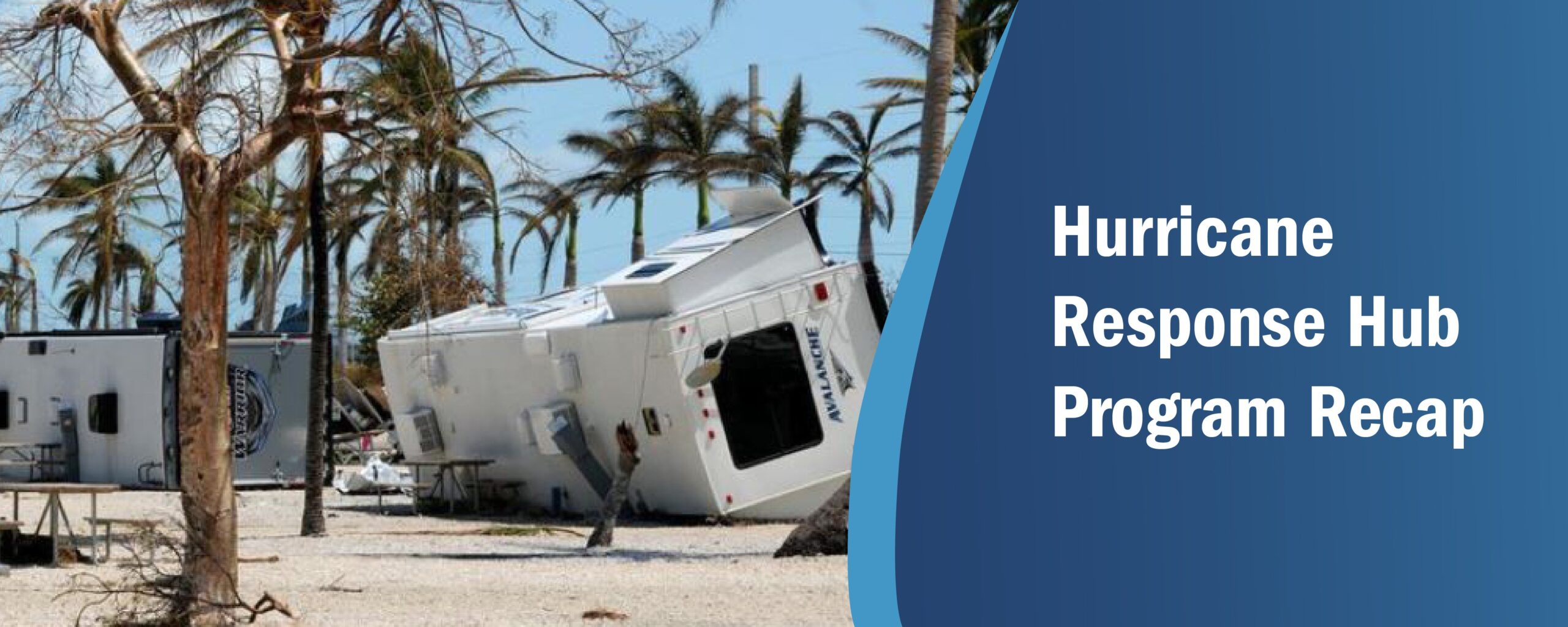Hurricane Response Hub: Program Recap
- By: National Network of Public Health Institutes
- Date
One year after the 2017 hurricane season, many affected communities were still in the midst of the recovery efforts due to the damage and destruction caused by Hurricanes Harvey, Irma, and Maria. To ensure disaster-related environmental and occupational health best practices were applied to ongoing recovery efforts, the Centers for Disease Control and Prevention (CDC) National Center for Environmental Health provided funding to NNPHI in 2018 to establish a Hurricane Response Hub (HRH) that would provide technical assistance to the recovery efforts. NNPHI, as the National Coordinating Center for Public Health Training (NCCPHT), provided support through the HRH initiative to the response and recovery efforts across five jurisdictions: Florida, Georgia, Texas, Louisiana, and Puerto Rico.
The HRH initiative created a Technical Assistance Center (TAC) in each of the five jurisdictions. Once established, the TACs worked with a wide range of partners that included public health and emergency management agencies, non-profit and community-based organizations, universities, and others to develop plans for providing technical assistance, training, and long-term sustainability of hurricane preparedness and recovery activities.
Next, a rapid needs assessment was conducted for each of the five jurisdictions to identify gaps in disaster-related training and resources that would guide responder workforce capacity-building activities. The needs assessments identified environmental health and occupational health training needs for public health professionals, first responders, and community-based organizations. Each of the five TACs approached the provision of technical assistance and training in a unique way that focused on the needs of their jurisdiction.
In Florida, where Hurricane Irma resulted in the deaths of more than 100 people and approximately $50 billion in damages, preparedness for future hurricanes was essential. The Florida TAC was established by the Florida Institute for Health Innovation and several partner organizations to promote responder workforce capacity-building based on three areas of excellence: Collective Impact for Healthy Communities, Health in All Policies, and Research, Evaluation, and Training.
Hurricane Irma’s damaging winds and heavy rainfall knocked out power to 1.5 million Georgia residents and sent 8,500 people into emergency shelters. The Georgia Hurricane Response TAC, housed in the Rollins School of Public Health at Emory University, brought together leading public health and healthcare preparedness professionals who worked on enhancing disaster recovery and resilience in the state. In addition to convening these leaders, the Georgia TAC developed a series of trainings, resources and web-based information systems that utilized a variety of modalities, to enhance disaster-related public health workforce capacity.
The devastating flooding caused by Hurricane Harvey prompted the Texas Public Health Institute to form a TAC that would develop several on-demand training courses delivered through Tulane University that focused on disaster-related environmental health, general disaster, and hurricane-related response, surveillance, and bioterrorism preparedness.
Louisiana Public Health Institute established the Louisiana TAC to build workforce capacity in disaster preparedness and response by collaborating with partners to identify and address environmental and occupational health recovery needs from the flooding caused by Hurricane Harvey. Responder mental health and disaster-related human tracking were two areas of training focus in Louisiana.
Puerto Rico experienced two Category 5 hurricanes just a few weeks apart in 2017, Hurricanes Irma and Maria. These storms challenged the delivery of healthcare and public health services and raised concern about the island’s ability to accurately assess mortality after a disaster. The Puerto Rico TAC, led by the Puerto Rico Public Health Trust, focused on building disaster response capacity within public health responders. The TAC also coordinated efforts to develop a disaster mortality surveillance curriculum for medical and nursing schools to improve disaster mortality reporting.
In addition to serving as the coordinating hub for the five TACs, NNPHI worked with partners to develop two ECHO series; “ Environmental Health Communication Strategies in a Hurricane Emergency Event ” and ”Individual and Workforce Resilience: Before, During, and After a Prolonged Hurricane Emergency. ” The ECHO sessions were intended to provide public health professionals with opportunities to hear from subject matter experts, participate in peer-to-peer learning, and share experiences from ground-level hurricane response and recovery. In the spring of 2020, when a second environmental health communication strategies ECHO cohort was set to begin, the COVID-19 pandemic abruptly changed the focus. The resilience series was quickly shifted to a COVID-19 focus to provide support to public health professionals who were feeling strained by the expanding crisis.
The structure of the Hurricane Response Hub project allowed both NNPHI and the TACs the flexibility to easily pivot their focus from hurricanes recovery to the dual disaster of hurricanes plus COVID-19. This adjustment was timely and critical with May being the start of the annual hurricane season there was much concern over how evacuations and emergency shelters would function under the threat of COVID-19.
This was not the first time the TACs had to juggle multiple disasters. Puerto Rico, still in recovery from the 2017 storms, experienced a series of earthquakes in late 2019 and early 2020 in the southern region of the island. The earthquakes sent residents, many who were still living in unsafe buildings, into outdoor shelters for weeks. The Puerto Rico TAC was able to assist with getting essential support to people who were living in substandard conditions in these camps.
The work of the Hurricane Response Hub TACs not only enhanced recovery from the 2017 storms, it improved overall emergency preparedness capacity and resiliency in their jurisdictions. Their experiences and accomplishments can serve as a blueprint for a coordinated, jurisdictional-level, all-hazards emergency preparedness, response, and recovery initiative. Because the Hurricane Hub initiative was a limited 2-plus year project using CDC funding support sustainability was a key element of the project from the beginning. The success of at least three of the TACs has attracted additional funding that will allow them to continue their preparedness and recovery work — Florida, Texas, and Puerto Rico have been able to transition from hurricanes to a wider disaster preparedness, response, and recovery focus.
As the Hurricane Response Hub initiative comes to a close in 2021, NNPHI, with support from the University of Chicago National Opinion Research Center (NORC) is conducting an evaluation of the project’s impact. The evaluation will review partnerships, activities, and outcomes across NNPHI and the five jurisdictions to compare their accomplishments with the results of the initial needs assessment. Interviews with key team members and partners in each jurisdiction will gather additional information on the impact that each of the TACs has had within their jurisdictions. A Hurricane Response Hub evaluation report will be prepared to detail the successes and challenges of the project; this report can serve as a guide for other jurisdictions facing recurring disasters due to climate change. The technical assistance center is a model that should be considered in areas where well-coordinated public health disaster preparedness, response and recovery efforts are needed due to recurring climate change-induced disasters.
NNPHI is grateful to the CDC National Center for Environmental Health for the opportunity to serve as the hub for the five technical assistance centers that worked diligently to improve recovery from the 2017 hurricanes and prepare for future disasters. Please check the NNPHI website for the project evaluation report that will be available in the summer of 2021. Meanwhile, you can contact the NNPHI emergency preparedness, response, and recovery program at EPRR@NNHPI.org
How You Can Get Involved
To get more information about our Emergency Preparedness, Response, & Recovery Team, visit here.


 Subscribe To Our Communications
Subscribe To Our Communications